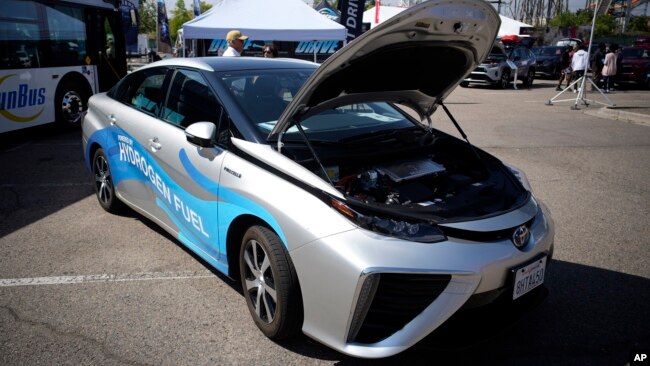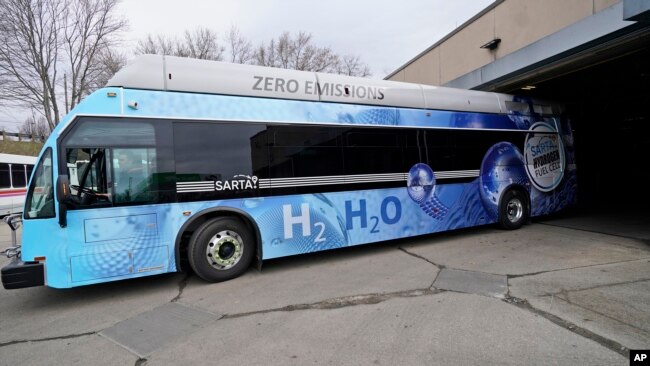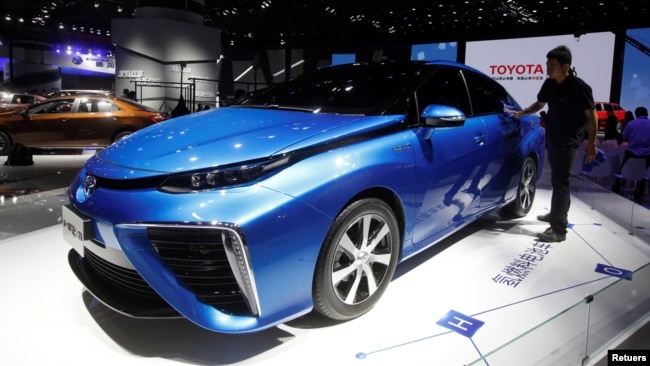車メーカーとして個人的に注目はポルシェです。独自の電池セル工場を建設中ですし、シリコンを使用した新世代の高性能バッテリーを開発中、また水素と二酸化炭素(CO2)を化学的に合成した燃料(eフューエル)水素ガソリンを開発中。独自性を貫いています。
しかしながら、EVのスタイルのかっこよさには痺れますね〜。
今回は車!!聞き慣れない単語が多く出てきますが、これがニュースのいいところ!!
Let's listen!!
複数の自動車メーカーが水素自動車の販売計画を推進(和訳)
Several Carmakers Push Plans to Offer Hydrogen-powered Vehicles
大手自動車メーカー数社が、水素自動車技術への投資を継続することを発表しました。この計画はまさに、多くの業界専門家が、水素自動車技術がバッテリーを搭載した電気自動車に対抗するための大きな苦境に直面しているところからきています。
水素自動車は、燃料電池電気自動車(FCEV)とも呼ばれています。FCEVは、燃料電池で水素ガスを電気に変換して走行します。FCEVは、燃料電池で水素ガスを電気に変換して走行するもので、a built-in batteryバッテリーを内蔵して走行する電気自動車とは異なります。
先月、トヨタ自動車の豊田章男社長は、水素自動車の実験レースに参加しました。これは、従来のガソリンエンジンを水素で走れるように改造したものです。
豊田氏は記者会見で、カーボンフリーの世界では、internal combustion engines従来の内燃機関を走らせることができるのです。そうすれば、内燃機関を完全に廃止する必要がなくなり、自動車産業の何百万人もの雇用を守ることができるといいます。
「敵は炭素であり、内燃機関ではありません」と豊田は言います。「一つの技術に集中するのではなく、すでに持っている技術を活用すべきだ」と述べています。
トヨタは最近、水素自動車 ミライ の第2世代モデルを発売し、今後数年間でさらに複数のモデルを提供する計画です。
ドイツでは、BMWとフォルクスワーゲン・グループが、一連の新しいEVとともに、水素を搭載した乗用車の開発を進めています。
BMWは先月、ドイツ政府が一部出資するプロジェクトで、X5モデルをベースにした水素プロトタイプ(試作車)を開発したと発表しました。ユルゲン・グルドナー氏は、BMWの水素自動車開発を率いる副社長です。彼はロイターに対し、同社は2022年に約100台の水素実験車を製造する予定であると語っています。

A 2021 Toyota Prius that runs on a hydrogen fuel cell sits on display at the Denver auto show Friday, Sept. 17, 2021, at Elitch's Gardens in downtown Denver. (AP Photo/David Zalubowski)2021年9月17日(金)、デンバーのダウンタウンにあるエリッチズ・ガーデンズで開催されたデンバー・オートショーで、水素燃料電池で走行する2021年型トヨタ・プリウスが展示されている。(AP Photo/David Zalubowski)
韓国の自動車メーカーであるヒュンダイの関係者も、EVの開発とともに、水素を利用した自動車の検討を続けることの重要性を語っています。現代自動車は、現在、NEXOという乗用燃料電池車を販売しています。
また、現代自動車は9月、2028年までにすべての商用車−大型輸送トラックやバスなど−に水素燃料電池車を提供する計画を発表しました。
燃料電池技術は、水素が酸素と結合して電気を発生させる技術です。水や蒸気が大気中に放出されるだけなので、クリーンなエネルギーと考えられています。そのため、世界の二酸化炭素排出量削減に貢献する技術として注目されています。
しかし、現在、世界中で生産される水素のほとんどは、汚染の原因となる天然ガスや石炭で作られています。
しかし、この技術を支持する人たちは、将来的にはこの状況が変わると期待しています。風力や太陽エネルギーによる電力の利用が増えれば、水の中の水素と酸素を分離できるようになると考えています。しかし、これらの製造方法はコストがかかります。
電気自動車の充電時間が長いのに比べ、水素自動車は数分で充電できます。しかし、この技術は非常に新しいものであるため、水素ステーションはほとんど存在しません。
水素燃料電池車の航続距離は約480kmで、一般的な電気自動車よりもはるかに長いです。しかし、バッテリー技術の向上に伴い、EVの航続距離はどんどん伸びていくと予想されています。
es.
もう一つの大きな違いは、コストです。現在販売されている多くのEVが3万ドル前後からの価格設定であるのに対し、燃料電池車の多くは5万ドル前後からの価格設定となっています。
現在、米国では約7,500台の水素燃料電池車が走っていますが、そのほとんどがカリフォルニア州にあります。また、カリフォルニア州には公共の燃料ステーションが45カ所しかありませんが、さらに多くのステーションが計画されていますし、建設中です。
業界の専門家によると、これらの理由から、水素を搭載した乗用車が電気自動車に対抗するには、まだ長い道のりが必要であると考えられています。米国では、バスや大型トラックなどの商用輸送車両の技術開発が進んでいます。ゼネラルモーターズ、ボルボ、ダイムラーなど、多くの大手商用車メーカーが、クリーンな走行が可能な水素に多額の投資をしています。
Several Carmakers Push Plans to Offer Hydrogen-powered Vehicles
Several big automakers recently announced plans to keep investing in hydrogen vehicle technology. The plans come even as many industry experts believe the technology faces a major uphill battle to compete against battery-powered electric cars.
Hydrogen-powered cars are also known as fuel cell electric vehicles, or FCEVs. With these vehicles, fuel cells convert hydrogen gas into electricity. This differs from electric vehicles, or EVs, which get their power from a built-in battery.
Last month, the chief of Japan’s Toyota Motors, Akio Toyoda, attended a race that demonstrated an experimental hydrogen vehicle. The vehicle contained a traditional gasoline-powered engine that had been converted to run on hydrogen.
Toyoda told reporters at the event such conversions could keep traditional internal combustion engines running in a carbon-free world. This, he said, could avoid the need to completely leave behind internal combustion and save millions of auto industry jobs.
"The enemy is carbon, not internal combustion engines,” Toyoda said. “We shouldn't just focus on one technology but make use of the technologies we already possess."
Toyota recently launched the second-generation model of its Mirai hydrogen vehicle and has plans to offer several more models in the coming years.
In Germany, BMW and Volkswagen Group are both developing hydrogen-powered passenger vehicles along with a series of new EVs.
BMW said last month it has developed a hydrogen prototype based on its X5 model in a project partly financed by the German government. Jürgen Guldner is a vice president who heads BMW’s hydrogen car development. He told Reuters the company plans to build about 100 hydrogen test vehicles in 2022.
Officials at South Korean automaker Hyundai have also spoken about the importance of continuing to explore hydrogen-based vehicles along with developing EVs. The company currently sells a passenger fuel cell vehicle called the NEXO.
And Hyundai announced in September it plans to offer hydrogen fuel cell versions for all its commercial vehicles – such as large transport trucks and buses – by 2028.
In fuel cell technology, hydrogen combines with oxygen to produce electrical power. It is considered clean energy because the process only releases water and steam into the atmosphere. This makes the technology a good candidate for helping the world reduce its carbon emissions.
Currently, however, most of the hydrogen produced worldwide is made using natural gas or coal – both of which cause pollution.
Supporters of the technology expect that to change over time. They say the growing use of electricity from wind and solar energy will be able to separate hydrogen and oxygen in water. Those production methods, however, are more costly.
Hydrogen-powered vehicles can fuel up in minutes compared to much longer charging times required for EVs. But because the technology is so new, very few hydrogen filling stations exist.
Hydrogen fuel cell cars have a driving range of about 480 kilometers, which is much higher than most EVs. But the ranges for EVs are expected to keep getting longer as battery technology improves.
Another major difference is cost. While many EVs currently on the market are priced starting at around $30,000, most fuel cell vehicles start at about $50,000.
Currently, there are about 7,500 hydrogen fuel cell cars on the road in the U.S., most of them in California. That state has just 45 public fueling stations, but more are planned or are being built.
Industry experts say these are all reasons why hydrogen-powered passenger vehicles have a long way to go to effectively compete with EVs. In the United States, the technology is much further developed for commercial transport vehicles, such as buses and heavy trucks. Many large commercial manufacturers, including General Motors, Volvo and Daimler, have heavily invested in hydrogen to power the clean-running vehicles.
Words in This Story
battery – n. an object that provides and stores electricity for things
convert – v. to change the appearance, form or purpose of something
internal combustion – n. a heat engine in which the combustion that produces heat takes place inside the engine itself
focus – v. to give special attention to something
prototype – n. an original or first model of something from which others are copied or developed
emission – n. the act of producing or sending out something (such as energy or gas) from a source
commercial – adj. relating to buying and selling things
HV・PHEV・PHV・FCV・EV・BEV・HEVとは?
BEV、その美しいスタイル
2021.5.29
ポルシェ

